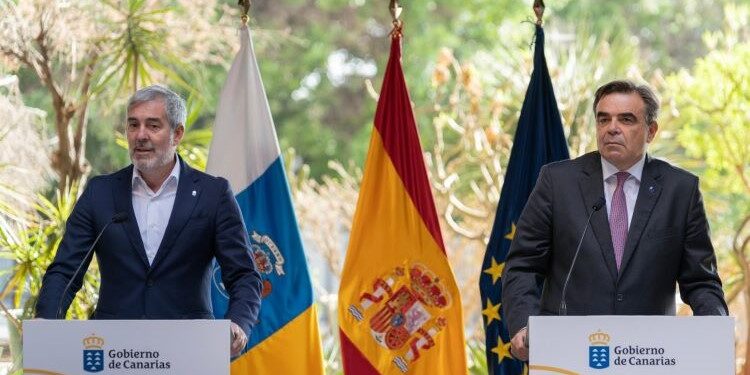The Diplomat
The European Commission has committed to allocating an additional 14 million euro package to the Canary Islands to help deal with the “exceptional” migration crisis that the archipelago is experiencing, as announced yesterday by the European vice president Margaritis Schinás to the Canarian president, Fernando Clavijo, during an official visit to the islands of Tenerife and El Hierro.
According to the Canarian Executive in a press release, Schinas presented yesterday a package of measures to guarantee that the islands “will not be alone” in the face of this crisis. Specifically, the European leader announced an additional 14 million Euros in aid, the possibility for Spain to use the European Regional Development Fund (ERDF) for its migration policies (for which the Spanish Government must formally request it), the carrying out of joint operations by the Frontex Agency, the increase in assistance from the European Asylum Agency, the intensification of cooperation with countries of origin and the development of the European Pact on Migration and Asylum.
During the joint press conference with Clavijo, Schinas conveyed a “simple but firm call for unity and solidarity” with Spain and the Canary Islands. “You are not alone. Europe is at your side.” For his part, the President of the Canary Islands highlighted the key support of the European Union in helping the Canary Islands manage the migration crisis and thanked Schinas for his response to the difficulties that the Canary Islands Government has encountered in recent months in providing dignified care to migrants who arrive on irregular boats to the islands, especially unaccompanied minors.
Debate in Congress
The migration issue was the subject of a new debate yesterday in the Congress between the Government and Vox, in which the Minister of Foreign Affairs, José Manuel Albares, defended the migration policy of the Executive, based on border control, development, respect for human rights and “the relentless fight against human trafficking”, and rejected the proposals of the far-right group in this matter, which would lead to less security at the borders and “conflict with our main neighbours”.
“We work for an orderly, regular migration, but yes, also safe and with humanism. A migration based on the control of our borders, on the development of those countries, on respect for human rights and on the relentless fight against human trafficking”, Albares stated before the plenary session of the Lower House in response to an urgent interpellation by Carlos Flores, of Vox, on the Government’s policy of collaboration with the countries around us regarding the defence of the borders.
According to the minister, in recent days the results of the collaboration between the Moroccan and Spanish police forces at the borders of Ceuta and Melilla are being seen. “Thanks to the collaboration with Morocco, the entry of thousands of people illegally into Spain is being prevented.”
On the other hand, he warned, if Spain followed Vox’s proposals in this matter, “the security cooperation policies that the Government has developed “successfully” with countries such as Morocco, Mauritania, Senegal or Gambia, nor the increase in development cooperation, would not have been carried out. In that case, he assured, “our borders would be much less secure and we would be in conflict with our main neighbours.”
“The only barrier that we know and accept is the one that should unite all democrats and that separates us precisely from that, from hatred, from division, from the confrontation that you, the extreme right and your extreme right allies in Europe, intend to bring to our society,” he added.
For his part, Flores took advantage of his speech to present Vox’s proposals on immigration: the “immediate expulsion” of migrants who arrive illegally and those who “make serious crime their way of life” and the elimination of aid to development cooperation organizations that “ultimately contribute to promoting illegal immigration.”
The Vox MP gave as an example Italy’s immigration policy through “successful measures” that are “antithetical” to the PSOE. “That our borders are safe is not connected to reality, our borders are a sieve and the fundamental responsibility lies with the Minister of the Interior, but you have a lot to say and more to do in this regard,” he continued.
Flores also welcomed “the collaboration that the Moroccan gendarmerie is apparently providing in recent days on the border between our two sovereign territories in Africa” but asked “what is the price of this collaboration, because Morocco does not do anything without a plan,” and denounced that Rabat “uses migration as a weapon of pressure.”







